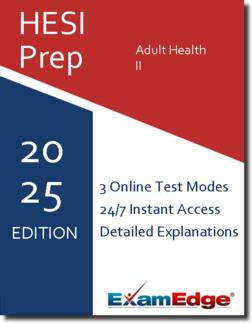HESI Adult Health II Practice Tests & Test Prep by Exam Edge - Topics
Based on 34 Reviews
- Real Exam Simulation: Timed questions and matching content build comfort for your HESI Adult Health II test day.
- Instant, 24/7 Access: Web-based HESI Adult Health II practice exams with no software needed.
- Clear Explanations: Step-by-step answers and explanations for your HESI exam to strengthen understanding.
- Boosted Confidence: Reduces anxiety and improves test-taking skills to ace your HESI Adult Health II .

Understanding the exact breakdown of the HESI Adult Health II test will help you know what to expect and how to most effectively prepare. The HESI Adult Health II has multiple-choice questions The exam will be broken down into the sections below:
| HESI Adult Health II Exam Blueprint | ||
|---|---|---|
| Domain Name | ||
| Respiratory system | ||
| Renal System | ||
| Cardiovascular System | ||
| Respiratory System Drug therapy Pneumonia | ||
| Renal System Drug Therapy | ||
| Cardiovascular System Drug Therapy |


